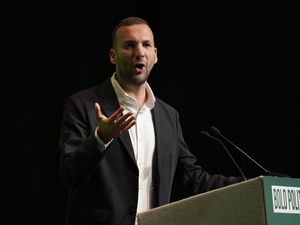Peter Rhodes: They changed the rules, not us
The EU's 60th birthday, the perils of rep and tailoring our taxes to suit our conscience.
I KNOW they mean well but can the politicians and Tweeters just back-pedal a bit on the “plucky London can take it” line? These Churchillian sentiments are usually spouted by those who have not suffered and they diminish the agony of those whose lives have been torn apart by last week's attack, who are maimed, bereaved, shell-shocked, demoralised and feeling utterly defeated. The last thing they need is to see people untouched by the savagery bouncing around like chirpy little Cockneys after the Blitz. Of course London will carry on. What else can it do? Some things need not be said.
THE actor Mark Rylance praises a “taxes for peace” idea from Ruth Cadbury MP which would allow conscientious objectors not to pay that part of their taxes which would support the armed forces. As Rylance puts it: “No society should force any of its citizens into a state of bad conscience.” This is not a new idea. More than 30 years ago the Campaign for Nuclear Disarmament suggested something similar. Ever willing to help, I devised a questionnaire to ensure individuals paid only for the sort of defence they wanted. One of the questions was: “In the event of war, do you want the Commander of the RAF to conduct: 1) an aggressive bombing campaign; 2) a defensive air-patrol campaign; 3) the RAF Band?
THEY still don't get it, do they? Commission President Jean-Claude Juncker led the hand-wringing and breast-beating as the European Union celebrated its 60th birthday without Britain. It was, he declared, a tragedy that the UK was leaving. Reality check, please. The whole point is that we are not leaving the organisation we joined back in 1973. The UK signed up to a free-trade area. We ended up as an unwilling member of an undemocratic 28-nation European superstate. Brussels changed the rules, not us. That's why we are quitting. And we won't be the last.
AS the Royal Shakespeare Company launches its Roman Season, the old question still fascinates me. How on earth do they remember the lines – especially in repertory where actors take sometimes huge roles in different plays? Some years ago the young David Tennant told me it was “like getting on a bus.” But as the years pass, the risk of getting on the wrong bus increases. One veteran RSC actor told me how, when appearing in several historical dramas, he strode onto the stage and realised it was not only the wrong scene, but the wrong play. As all the other actors' eyes turned on him, he declared in perfect iambic pentameter: “My liege, I shall myself remove forthwith” and exited, with a flourish.
I REPORT slow progress in training our old moggie to use the new cat flap. I say “flap” but the only place to install it was through a wall, so it's more of a cat tunnel. Although he is old and tubby, the problem is not so much physical as psychological, getting him to understand that the hole in the wall is for his use. The cat's attitude so far is that it's very interesting but why would he go through it when he has staff to open the doors? Any advice most welcome.





